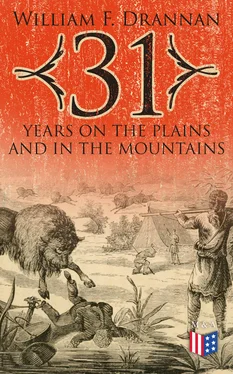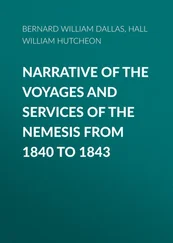There were about five hundred men in this tribe, all of whom were apparently very industrious, raising corn, melons, red pepper and other vegetables in abundance. They raised some very large melons, which were not excellent in flavor, however.
The Pimas were very kind to us while we were with them, often taking us out to their truck patches and pulling nice, large melons for us. I asked a very aged Indian where they got their seed corn, but he did not know, saying they had raised it ever since he could remember. They did their plowing with wooden plows, which they made themselves, being pulled by oxen that were hitched to the plows by a strong stick in front of their horns. For harrows they used brush, and they had shovels made of wood to dig with.
Notwithstanding they were in one sense uncivilized, they showed us more hospitality during the time we were with them than most white people would have shown to strangers.
These Indians keep their age by taking a piece of horn, pressing it out flat and punching a hole in the center. When a child is a certain age he has one of these tied about his neck, and every year the child is supposed to cut a notch in the piece of horn. I did not learn how old they had to be before they were supposed to keep their own age.
We found the chief of the tribe to be very obliging. He told us the Apaches were bad Indians, and that they had killed many white people—men, women and children.
When we were ready to leave the village, the chief came out and bade us good-bye, and gave us a cordial invitation to call on him when passing through the country.
We crossed the Gila river near where Colville now stands. Here was a tribe of very indolent Indians, that during this season of the year did not wear a stitch of clothing of any kind whatever. They were known as the Yumas.
We both emptied our rifles before crossing the river, knowing that they would get wet in crossing. I fired at a bird across the river and it fell to the ground.
At the crack of my rifle the Indians ran a few paces from me, dropped down and stuck their fingers in their ears. They told us in Spanish that they had never seen a wah-hootus before, meaning a gun with a loud report.
When Jim Beckwith went to fire his gun off, the squaws all ran away, but the bucks, being more brave, stayed, but held their hands over their ears. This tribe lived principally on fish.
The reader will remember that I had traveled over this same country in the year 1849 in company with Kit Carson and Col. Fremont, when on our trip to California.
After traveling about five miles we crossed a little sage-brush valley that was almost covered with jack-rabbits, and they were dying by the thousand. We could see twenty at one time lying dead in the sage-brush.
That night we camped on what has since been known as Beaver creek, and here we had to strike across the San Antonio desert, and having been across the desert I knew it would be eighty miles to water. Having two parafleshes with us for such emergencies, we filled them with water to use in crossing this desert.
A paraflesh is made of rawhide expressly to carry water in, and are frequently used to peddle milk by the Mexicans.
The second day from Beaver creek we reached a little stream near the Goshoot village, this being the place where Uncle Kit finished buying furs to load his pack-train in 1848.
The next morning we reached the village. I had not seen any of these Indians for five years. Then I was a mere boy and now a grown man, but every one of the Goshoots knew me and were glad to meet me. We stopped that day and visited with them, and bought some venison and frigoles, or beans.
The next morning we resumed our journey to Los Angeles, crossing the extreme northeast part of Death Valley. From here on the country was all new to me, and had it not been for the kindness of the Goshoot Indians, we would have perished for the want of water.
When I told a good Indian in that village where we were going, he sat down and with his finger marked a diagram in the dust, showing the lay of the country that we must pass ever, every little blind spring near the trail, the different mountains and valleys, and made it so plain that we could scarcely have made a mistake on the trip.
On arriving at Los Angeles we found only one white man in the place, and he was the only person in the whole town that could speak the English language. He had arrived there some years before, married a Mexican woman and had got to be very wealthy. He tried to induce us to go farther up the coast, telling us if we started for San Francisco the country was full of Mexicans, and that they despised all Americans and would be sure to murder us on our way; but as we had started for San Francisco, we were determined to see that city if possible. After laying over one day with the old American we resumed our journey.
The next place we struck was Monterey, where is now the famous Hotel del Monte, about two hundred miles from Los Angeles. Here we did not find a man who could speak a word of English, and we found the Mexicans still more selfish than in Los Angeles.
We began to think that the old white man had told the truth, for we would not have been surprised at any time to have been attacked by a band of Mexicans.
While here I saw two persons that I thought to be curiosities. They were of Indian parentage, light complexion and had eyes of a pink color. One was a boy about twenty years old and the other a girl of sixteen, and were brother and sister. It was claimed that they could see well after night, but could not see their way on a bright, sunny day.
These Indians were said to be of the Mojave tribe, that inhabited a portion of the country some six hundred miles east of Monterey, near the Mojave desert. I have since learned that such freaks are called albinos.
The reader will no doubt wonder why we came this round-about away to get to San Francisco. The reason is that in coming a more direct course we would have passed through a country that was infested with wild tribes of Indians; that is, tribes hostile to the whites. There being only two of us the chances were it would have proved a very unhealthy trip for us at that time.
Конец ознакомительного фрагмента.
Текст предоставлен ООО «ЛитРес».
Прочитайте эту книгу целиком, купив полную легальную версию на ЛитРес.
Безопасно оплатить книгу можно банковской картой Visa, MasterCard, Maestro, со счета мобильного телефона, с платежного терминала, в салоне МТС или Связной, через PayPal, WebMoney, Яндекс.Деньги, QIWI Кошелек, бонусными картами или другим удобным Вам способом.












